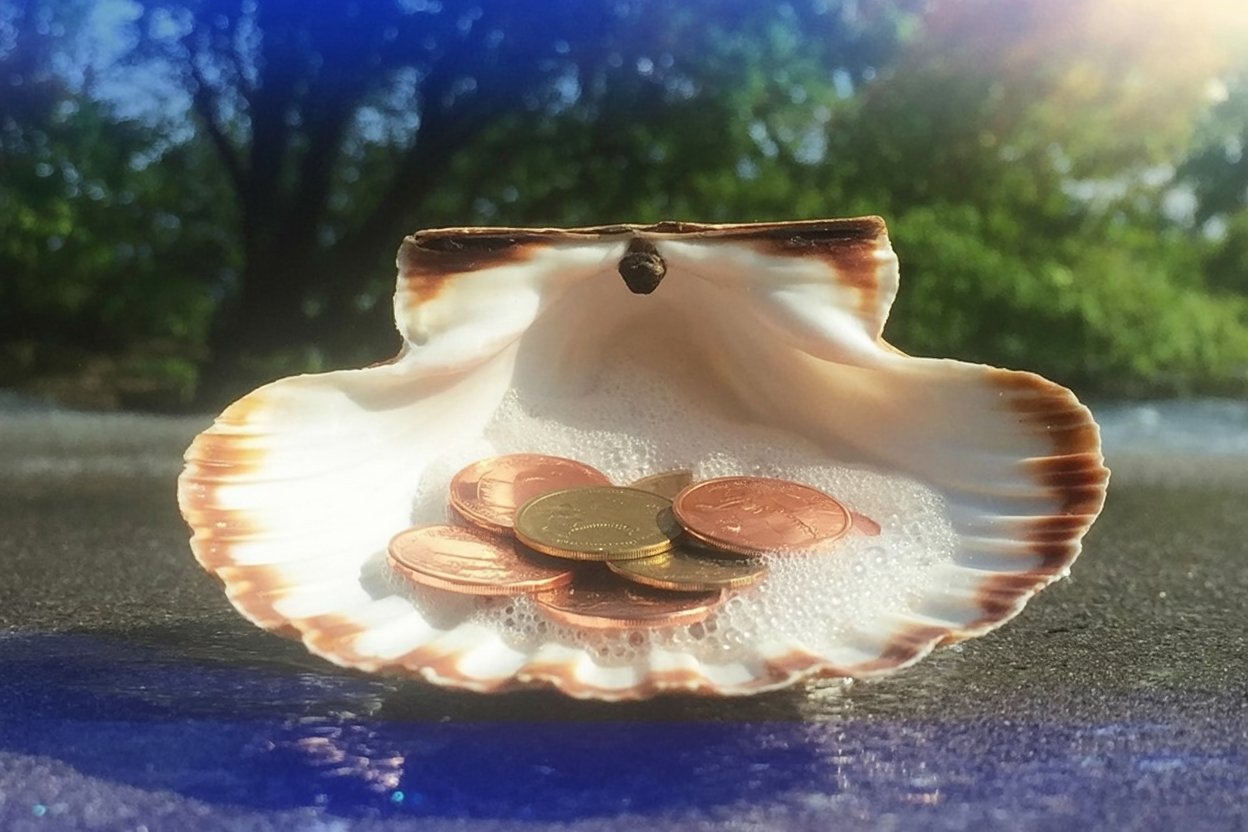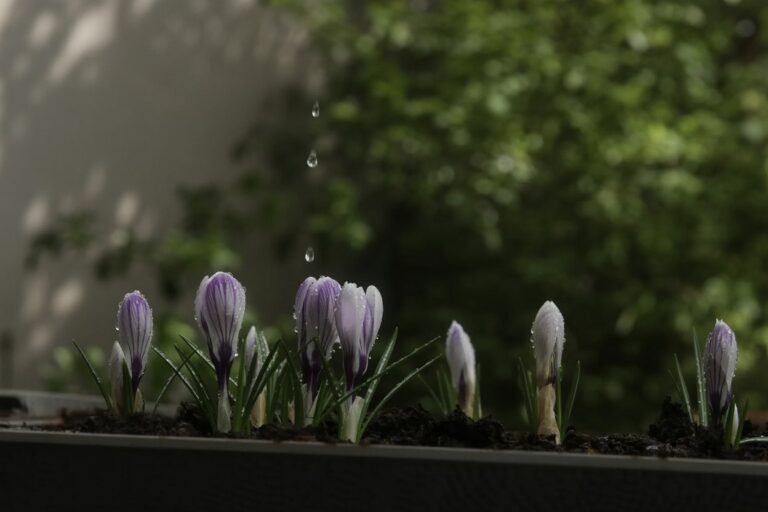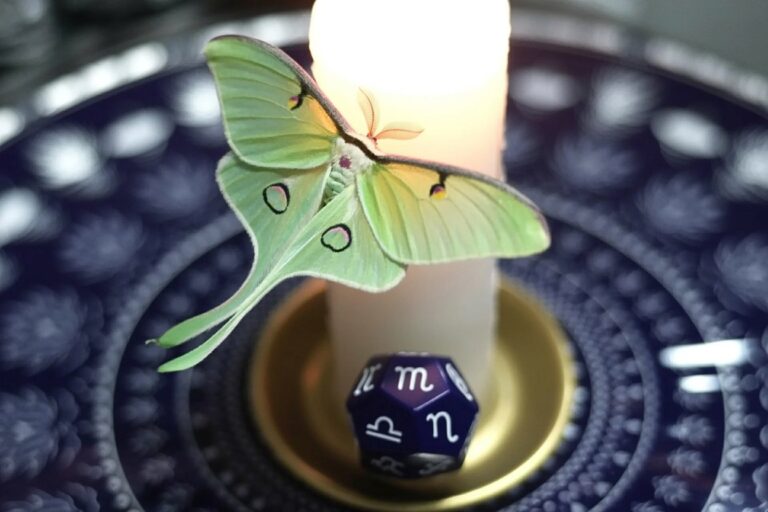15 Aphrodite Journal Prompts That Actually Connect To Her Mythology
Please note that posts on this site may contain affiliate links
You want to work with Aphrodite, and you need actual questions to ask yourself. Questions that connect to who Aphrodite really is: born from an act of violence, emerging as pure beauty. The force that makes things want to come together. The deity with a warrior past the Greeks tried to domesticate.
Here are 15 journal prompts that dig into what Aphrodite actually governs. Your relationship with beauty and worth. How desire moves through you. The patterns playing out in your relationships. Sexuality and what it means to live in your body. Power that works through attraction instead of force.
Each prompt connects to something specific about Aphrodite. Her myths, the names ancient people called her by, how they actually worshipped her. This treats journaling like the psychological tool it is while using her stories as a lens. You’re using her specialties to look at your own life.
Who Aphrodite Actually Is
She was born when Cronus castrated his father Uranus and threw the severed genitals into the ocean. From the sea foam around them, Aphrodite rose. Fully formed. No childhood, no growing up. Violence became beauty in one instant. That origin tells you something: in her world, beauty and trauma exist together. Things transform through difficulty, becoming something else entirely.
The Greeks who actually worshipped her knew her in different forms. Ourania (heavenly) and Pandemos (of all people, earthly). Her epithets show someone way more complicated than Valentine’s Day: Ambologera (postpones old age), Philomeides (laughter-loving), Areia (warlike), Melainis (the dark one).
That last one surprises people. Aphrodite has a shadow. She tortured Psyche out of jealousy. She’s vain. She plays favorites. The ancient Greeks understood: pleasure comes with its blocks. Love includes jealousy. Beauty exists alongside what makes you feel ugly. They worshipped the whole goddess, shadow and light.
Her roots go back to Ishtar, Inanna, Astarte. Near Eastern goddesses who ruled sexuality and war. The Greeks softened her, but traces remained. In Sparta they worshipped armed Aphrodite statues. She rules every kind of attraction: romantic, sexual, aesthetic, magnetic. The force that makes separate things want to join.
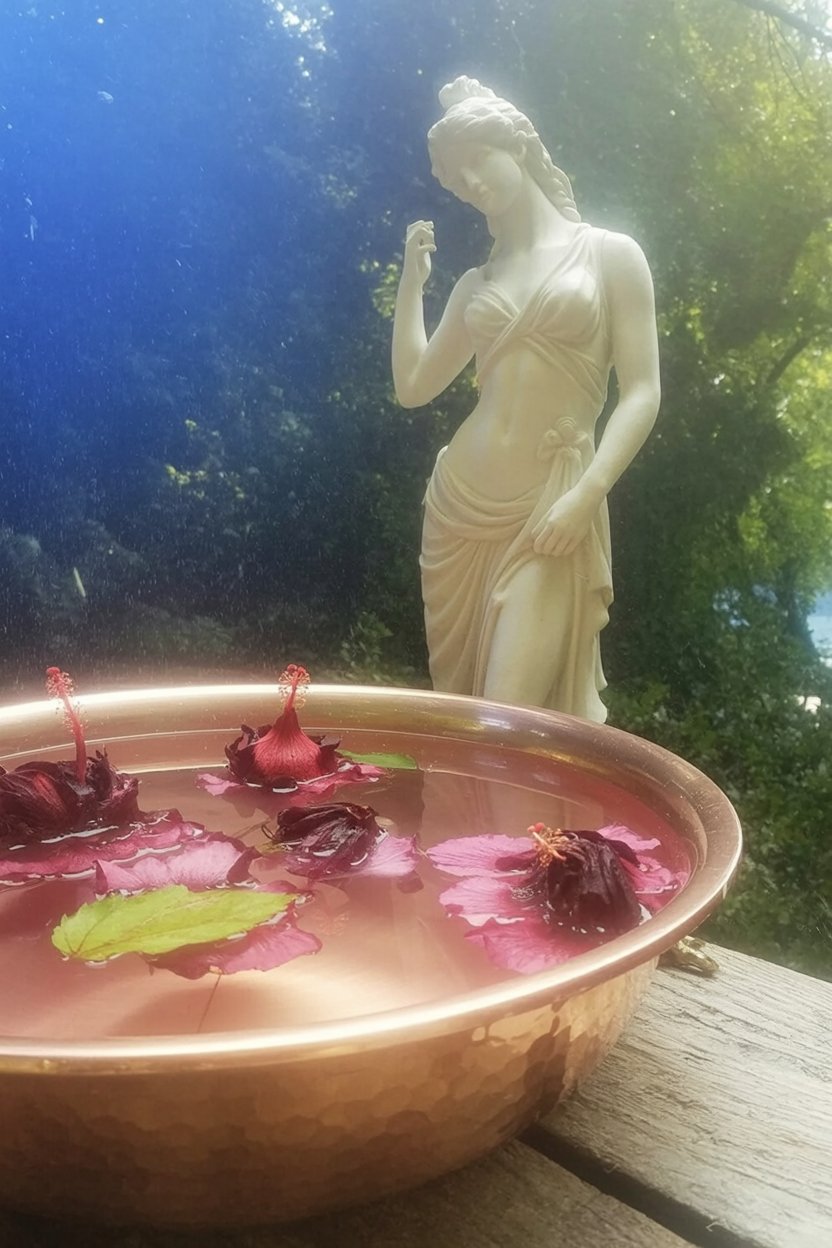
Why Journal With a Goddess
Two things happen when you do this, and you can believe both or just one.
First, the science is real. Writing about something creates distance. You can see it more clearly. Putting feelings into words lights up different parts of your brain than just thinking does. You process things, spot patterns, work through what’s stuck.
Second, using a goddess as a framework gives you thousands of years of human observation compressed into stories. How desire works. How beauty functions as power. How jealousy eats connection. How pleasure teaches you about worth. When you ask “What would Aphrodite notice here?” you’re tapping into that.
Ancient practitioners meditated on their gods’ names and stories. They got it. The myths were teaching tools. Each epithet revealed something different. Ambologera (postpones old age) pointed at a vitality that has nothing to do with being young. Pandemos (of all people) reminded them that pleasure belongs to everyone.
These prompts are structured questions from someone who spent weeks reading how actual practitioners work with her and connecting her qualities to real psychological insights.
How to Use These
Pick one prompt at a time instead of trying all 15 at once. You’ll skim the surface and exhaust yourself otherwise.
Spend at least 20 minutes with it. Some people free-write, letting their pen move without stopping. Others think through each question carefully. Both work. A dedicated journal helps you track patterns over time. Do whatever helps you be honest.
Work through them in order, or jump to whichever one makes your stomach tighten. That physical response usually means you’re onto something.
Keep it private unless sharing helps you. Some people need to talk things through with a therapist or friend. Others need to know no one will ever see this to feel safe being completely honest.
Come back to these as you change. Your answer about desire at 25 will look completely different at 35 or 45. That difference matters.
If you want to set up altar space, roses, shells, mirrors, copper or rose-gold create the right feel. But your kitchen table with a notebook works fine too. She cares about honesty more than aesthetics.
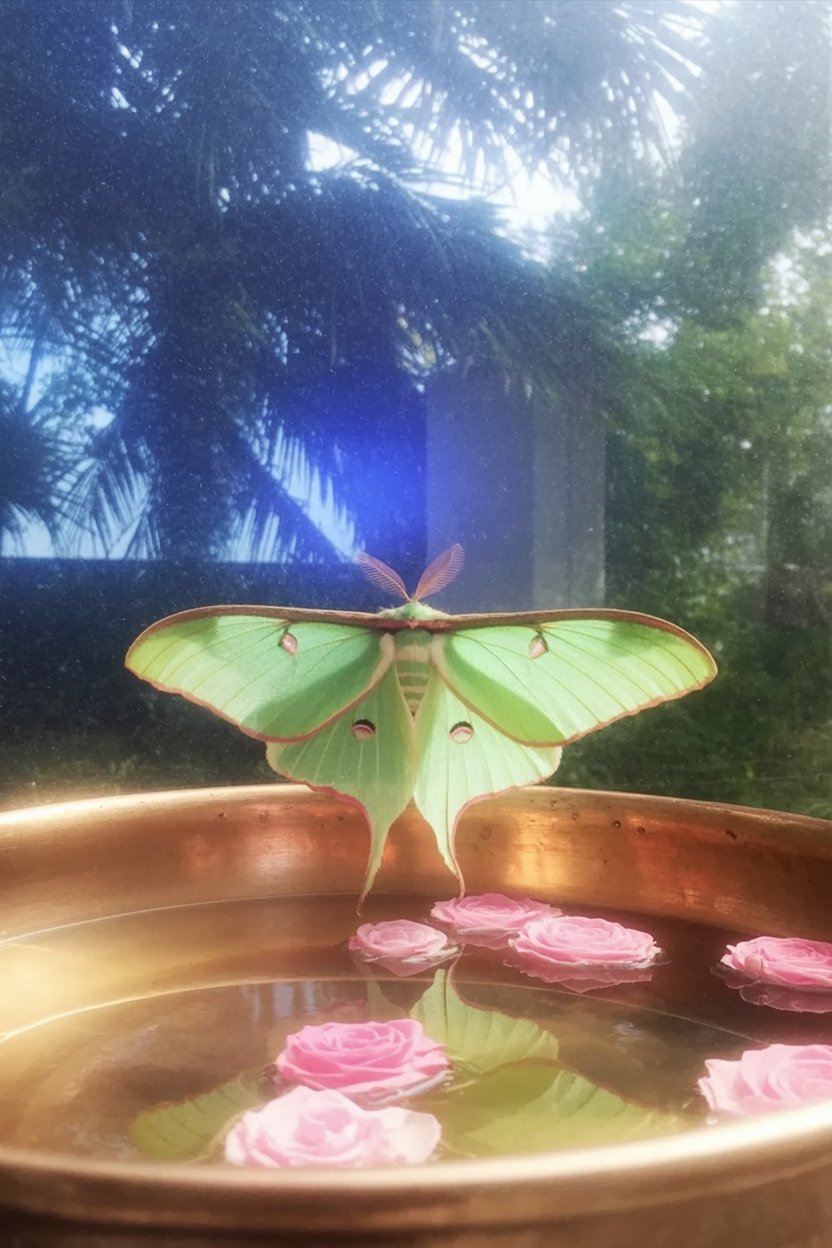
The 15 Prompts
Beauty & Worth
1. What does beauty mean to you beyond what you look like?
Aphrodite aspect: Ambologera (She Who Postpones Old Age)
Aphrodite postpones old age through the energy of someone who knows their worth. Beauty is a magnetic quality that has nothing to do with youth or symmetry.
Think about:
- When have you felt most beautiful? What was happening inside, not outside?
- Who in your life radiates beauty despite not fitting conventional standards? What quality do they have?
- If your body couldn’t change at all, what would beauty mean?
- Which beauty standards do you carry that aren’t actually yours? Where did they come from?
What might surface: You’ve been performing beauty for approval rather than experiencing it as an internal state. Beauty has been your weapon or shield, never your gift.
2. Where do you deny yourself pleasure?
Aphrodite aspect: Pandemos (Of All the People)
Pandemos is the earthy side of Aphrodite. She teaches that pleasure is feedback. Your body tells you what’s life-giving through pleasure and what’s harmful through discomfort. Where you deny pleasure, you’re ignoring information.
Look at:
- What pleasures feel forbidden? Food without “earning” it, rest without exhaustion, touch, beauty, ease
- Where did you learn pleasure was dangerous or selfish?
- What small pleasure could you allow today without justifying it?
- How does your body signal yes versus no? Do you listen?
What might come up: Trauma that made pleasure unsafe. The realization you’ve been punishing yourself through deprivation. The exhaustion of decades of self-denial.
3. How do you receive compliments and affection?
Aphrodite aspect: Philomeides (Laughter-Loving)
Aphrodite receives praise with laughter and joy. How you handle compliments shows your worthiness wounds more than almost anything else.
Watch for:
- Do you deflect (“Oh, this old thing?”), minimize (“Anyone could do it”), or redirect (“You’re sweet”)?
- Can you say “thank you” and actually feel being seen?
- What would it mean to believe compliments are accurate instead of polite lies?
- Where does discomfort with celebration come from? What happens in your body?
What might emerge: Deep unworthiness or terror of being “too much.” Receiving love feels more vulnerable than giving it. You’ve been starving for recognition while batting it away.
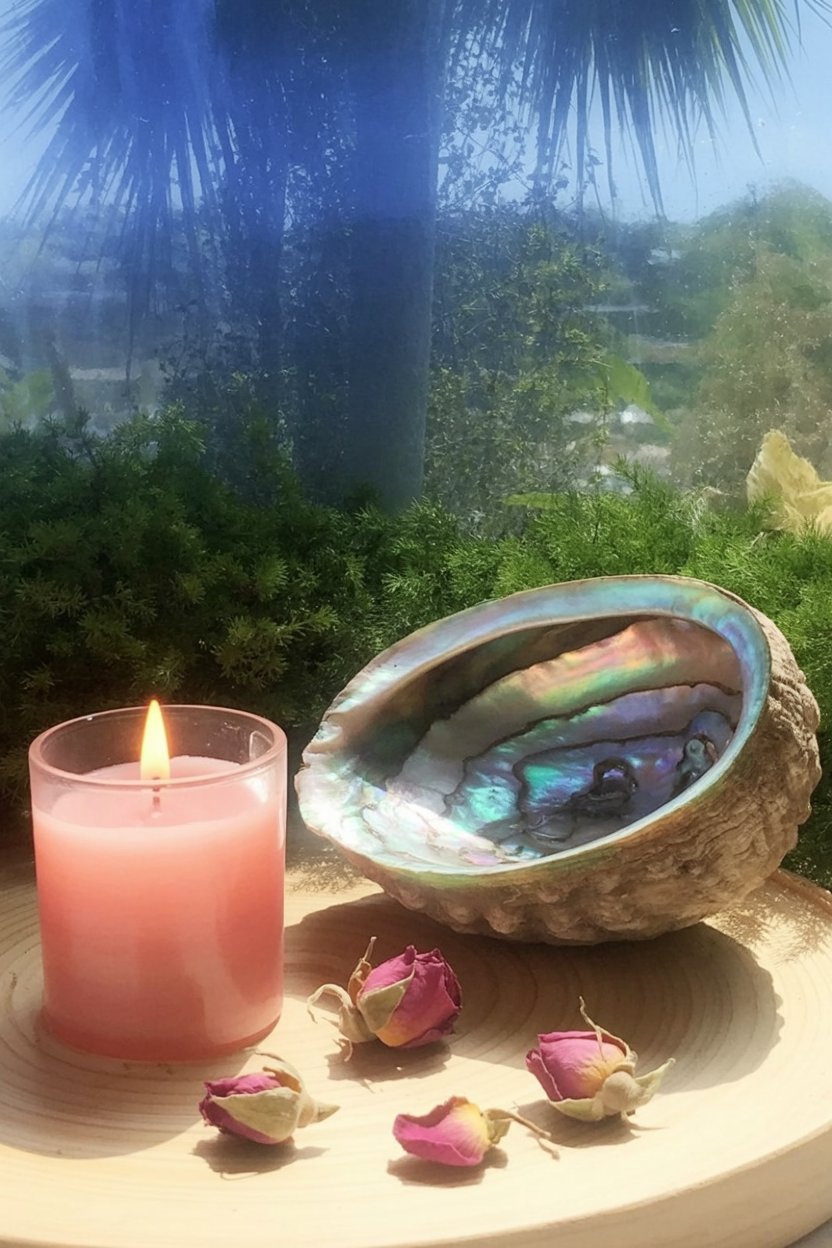
Desire & Attraction
4. What do you actually want when you strip away what you think you should want?
Aphrodite aspect: Real desire versus performed desire
We confuse desire with need, want with should, craving with real longing. Aphrodite rules true desire, the magnetic pull toward what genuinely calls you.
Ask yourself:
- If no one would judge and failure was impossible, what would you choose?
- What desires have you dismissed as impractical or unrealistic?
- Where do your desires contradict your values? (Might mean the desires need examining, or the “values” aren’t yours)
- What desire feels too vulnerable to speak aloud even alone?
Where this leads: You might realize you’ve been living someone else’s life. You might discover desires that would require dismantling current structures. You might face the raw terror of wanting.
5. Who or what pulls you in, and what does that reveal?
Aphrodite aspect: Attraction as information
What consistently draws you reveals both gifts you need and wounds seeking healing. Aphrodite teaches that desire contains information.
Think about:
- What qualities consistently attract you in people? Not just romantic
- What patterns repeat in who you’re drawn to?
- Are you seeking completion (filling a lack) or resonance (recognizing similarity)?
- What childhood need is your adult attraction trying to fill?
Where this gets real: You might see how trauma shapes attraction. You might realize you’re drawn to people who recreate familiar pain because familiarity feels like safety even when it hurts. The difference between chemistry (nervous system lighting up) and compatibility (actually building something sustainable).
6. Do you pursue what you want or wait to be chosen?
Aphrodite aspect: Active versus passive
Aphrodite both desires and is desired. She pursues Adonis and Anchises while gods and mortals pursue her. She shows agency in desire.
Consider:
- Do you typically initiate or wait for invitation?
- What gender or cultural rules shape how you’re “allowed” to want?
- Where do you fear rejection enough to never risk asking?
- What would change if you actively pursued what you want?
Difficult terrain: Fear of rejection or shame about desire. Passivity as protection. Anger about having to mute your wanting to be considered appropriate or attractive.
Relationships & Connection
7. What relationship patterns keep repeating, and what are they trying to teach?
Aphrodite aspect: Relational patterns as curriculum
Aphrodite governs all relationships, not just romantic. Recurring patterns are lessons. The same one appears in different faces until you learn it.
Track:
- What repeats with different people? Abandonment, smothering, betrayal, unavailability, intensity then withdrawal
- What role do you play? Rescuer, pursued, caretaker, rebel, victim, hero
- What would happen if you chose completely differently?
- What belief about yourself does the pattern confirm?
What you might see: Your role in creating painful patterns. How you’re addicted to familiar pain because unfamiliar joy feels dangerous. The terror of healthy relationships where you’d show up as your actual self.
8. Where do you lose yourself in relationships, and where do you wall off?
Aphrodite aspect: Intimacy with sovereignty intact
Aphrodite has many lovers but belongs to no one. She shows both deep intimacy and complete self-possession. Most of us swing between losing ourselves through merger and protecting ourselves with walls. Both prevent real connection.
Notice:
- Do you merge and lose boundaries, or stay isolated and protected? Swing between both?
- Can you be deeply connected while remaining yourself?
- What threatens your sense of self in intimacy?
- Where did you learn love requires self-sacrifice or self-protection?
Hard truths: Relationships might be escape from self. Your walls might prevent the connection you desperately want. Terror of both merger (losing yourself) and separation (being alone) drives everything.
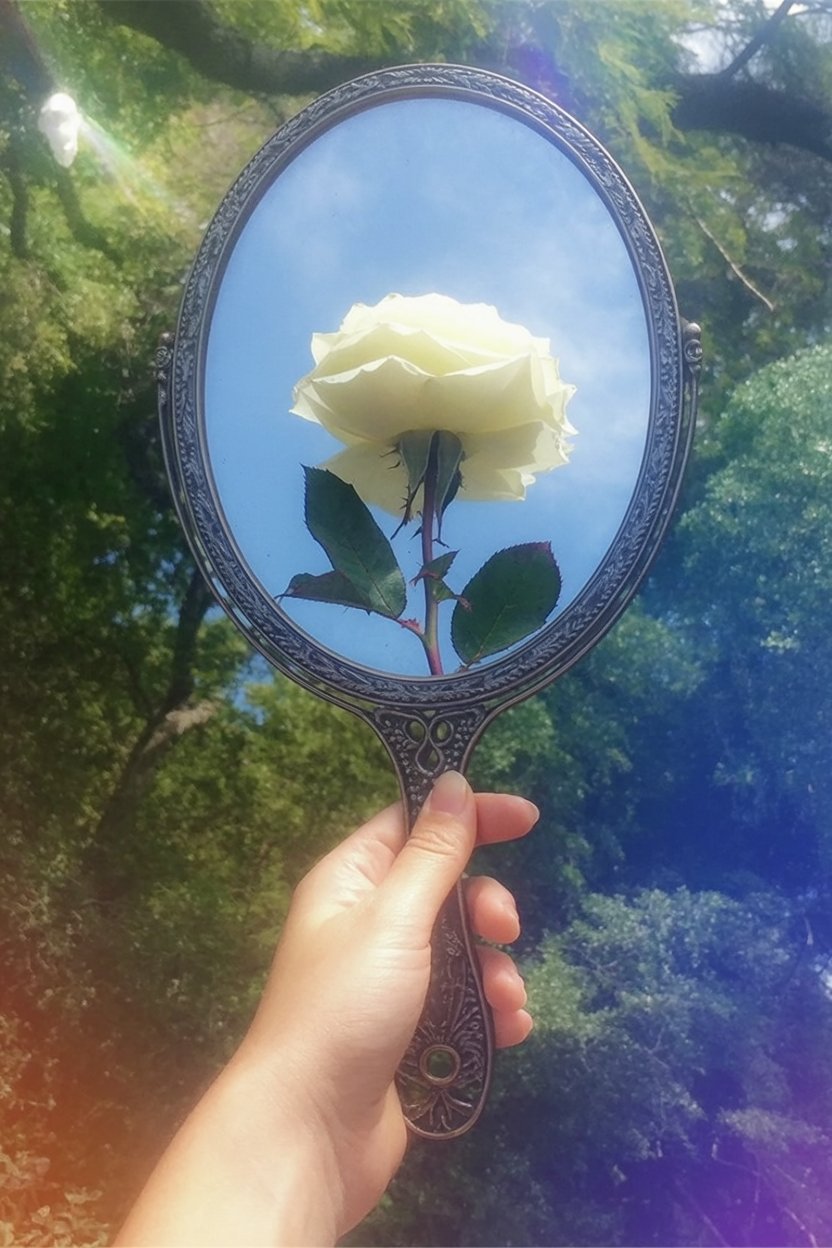
9. How do you handle jealousy, possessiveness, comparison?
Aphrodite aspect: Her shadow side
Aphrodite herself gets jealous. She tortured Psyche over beauty and Eros’s love. These feelings leak out sideways when you deny them.
Explore:
- When do you feel jealous or compare yourself?
- What does jealousy reveal about what you want or fear?
- Can you acknowledge these feelings without acting destructively?
- Where have you been possessive or controlling?
Shadow work: The parts you find ugly or shameful. How insecurity drives controlling behavior. Scarcity thinking in love (if they love someone else, less is available for you).
Sexuality & Embodiment
10. What’s your relationship with your sexuality? Joyful, shameful, disconnected, empowered?
Aphrodite aspect: Sacred sexuality
Aphrodite rules sexuality as sacred, pleasurable life force expression. The wisdom that comes from being fully present in your body during pleasure.
Look at:
- What messages about sexuality did you get growing up? From family, religion, culture, media, early experiences
- Do you experience sexuality as yours or as performance for others?
- Where does shame physically live in your body about sexuality?
- What would sexual wholeness feel like?
Difficult territory: Sexual trauma or conditioning. Shame directing your life from shadows. Sexuality as power tool or control rather than pleasure. Grief over what was taken or never developed.
11. Where do you fully inhabit your body, and where do you leave it?
Aphrodite aspect: Full embodiment
Aphrodite is fully embodied. She celebrates flesh. Leaving your body disconnects you from pleasure, desire, intuition, the wisdom that arrives as sensation before words.
Map:
- What brings you fully into your body? Dance, sex, exercise, eating, singing, creating
- Where do you numb out? Scrolling, substances, overwork, busyness, spacing out
- What sensations is your body trying to tell you right now?
- What would full embodiment feel like?
Where this leads: How much you live in your head. Reasons your body became unsafe (trauma, illness, judgment, objectification). You’ve been running from physical reality because feeling anything means feeling everything.
12. How do you care for your body? Obligation, punishment, or loving devotion?
Aphrodite aspect: Beauty rituals as self-love
Aphrodite’s grooming rituals were devotional self-love. How you care for your body shows how you feel about inhabiting it. Self-care becomes ritual when you approach it with intention.
Think about:
- Is self-care joyful ritual or joyless maintenance?
- Do you punish your body through neglect or excessive control?
- What would it mean to care for your body as sacred instead of problematic?
- Where can you bring actual pleasure into routine care?
Hard realizations: How you’ve been at war with your body. Self-care has been about fixing flaws, not loving what is. Exhaustion from beauty standards that shift faster than you can adapt.
Power & Transformation
13. Where do you use power through softness, and where do you confuse softness with weakness?
Aphrodite aspect: Power through attraction
Aphrodite influences through beauty, desire, attraction. Throughout history, people who understood how to make others want things changed the world more effectively than people who tried to force compliance.
Reflect:
- When have you changed someone’s mind through attraction instead of argument?
- Where do you default to hardness when softness would work better?
- What makes you afraid to be soft? Vulnerability, fear of manipulation, loss of control, gender conditioning
- Can power exist alongside softness?
What emerges: How you’ve armored against tenderness. How you’ve scorned “feminine” power as invalid while exhausting yourself with “masculine” power. How you’ve used softness to manipulate because you thought it was your only option.
14. What past heartbreak or betrayal still shapes how you love?
Aphrodite aspect: Transformation through loss
Aphrodite loses Adonis to a hunting accident. She knows grief. Unhealed heartbreak becomes armor preventing new love. She teaches transformation through loss.
Look at:
- What loss do you still carry?
- How did it change your capacity to trust, open, risk?
- What belief about love did that experience create?
- What would healing look like? Not forgetting, but releasing its grip on your present
Difficult work: You might realize you’ve been protecting against pain that already happened. You might face anger or grief you’ve avoided for years or decades. One wound shaped everything after it.
15. If you fully embodied Aphrodite’s energy, what would shift?
Aphrodite aspect: Everything together
This last prompt pulls it all together. What would your life look like if you knew your beauty, received pleasure without guilt, expressed desire freely, loved powerfully, influenced through attraction?
Imagine:
- What daily choices would change?
- How would you move through the world differently?
- What relationships would shift or end?
- What new experiences would you allow?
- What risks would you take?
The gap: Between current life and potential. Between who you’ve been and who you’re becoming. Terror of full aliveness and visibility. How small you’ve been playing.
What You Do With What You Find
Insight needs action to create change. You can journal through all 15 prompts, feel moved, then return to exactly the same patterns. That’s performance, not change.
Look for themes that repeat. If pleasure avoidance shows up in prompts 2, 10, 11, and 12, that’s a central pattern organizing your life.
Here’s how to actually shift something:
Name the pattern clearly. Get specific: “I deny myself pleasure because I learned wanting things made me selfish and burdensome.”
Understand where it came from. What purpose did this serve at the time? When did you learn this?
Choose one different action. One small experiment. If you discovered you deflect compliments, practice saying “thank you” without explanation this week. If you never initiate, text someone first once.
Small consistent experiments build different brain patterns better than massive unsustainable changes. You’re testing if a different way might work.
Share what you discover with people who can hold it well. A good therapist. Friends who do their own work. Communities of practitioners who get deity work. Not everyone needs to hear your insights, but the right people can help you actually shift.
Return to these prompts as you change. Set a reminder for six months from now. Answer the same questions. The shifts show you where you’ve grown and where you’re stuck.
Aphrodite work continues beyond journaling. Offerings. Prayers. Spell work. Altar practices. Meditating on her different names. Building relationship with her over time. The prompts are a beginning.
Test your knowledge
The Goddess Born From Violence
Aphrodite emerged from castration, blood, sea foam. Violence transforming into beauty. She arrived complete.
That’s the energy here. These prompts ask you to look where you’ve been wounded and see what beauty might be trying to emerge. Where shame lived, pleasure wants to grow. Where unworthiness ruled, recognition of inherent value wants to surface. Where you armored your heart, connection wants to break through.
Aphrodite is teaching you to embody love. To become the person who can receive it, express it, recognize it in all its forms.
Your worthiness already exists. Always has. Something to remember. Something always true, just buried under years of messages saying otherwise.
This is practice. The verb. You return. You notice where answers change. You watch yourself transform through patient self-inquiry that lets truth gradually surface.
Aphrodite rose from chaos into beauty. You can too.

Aphrodite of Love and War: Harnessing Magic for Romantic Victory
Unleash the dual powers of love and war with ‘Aphrodite of Love and War: A Spell Book for Romantic Warfare‘ for just $5.99—master the art of romantic magic and transform your desires into reality.

